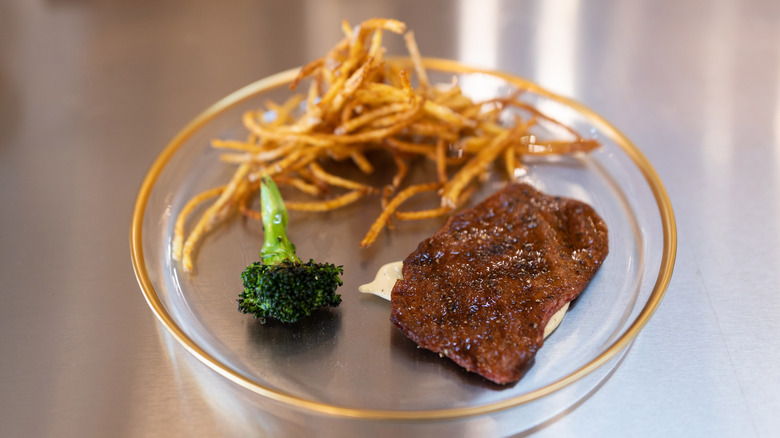Lab-Grown Meat Raises Debate Over Halal And Kosher Qualities
The American food market saw a huge milestone recently when the U.S. Department of Agriculture (USDA) gave the okay for two companies to sell lab-grown meat. But that announcement is already causing some confusion about the ethics of slaughter-free meat, and its status as halal or kosher. The ability to produce real meat without killing an animal should seem like a win-win across the board, but in the world of food, and meat specifically, nothing is that easy. Both halal and kosher meat aren't just referring to the types of animal you can eat, but the specific ways they need to be killed and prepared. Those rules raise the tough question of whether lab-grown meat is meat at all, and whether they would be subject to the same requirements.
As of right now, neither Upside Foods nor Good Meat, the two companies that received approval from the USDA, have gotten lab-grown meat certified kosher or halal, although both are exploring avenues to sell the new products that way (via CNN Business). Lab-grown meat comes from animal cells, so it is not considered vegetarian by either company, but the fact that no animals need to be killed for the process to work complicates traditional debates around meat consumption. Since lab-grown meat sometimes uses cells taken in biopsies from live animals, it could violate halal rules. However, cells taken from an animal slaughtered properly could make the meat kosher or halal.
Religious scholars and leaders disagree on lab-grown meat
The lab-grown meat industry seemingly got a break on some of these fraught religious questions earlier this year, when Israel's head rabbi, David Lau, ruled that cultivated meat was not only kosher but in the same category as vegetable products, via TIME, thus possibly exempting it from many kosher rules. However, other Jewish scholars have disagreed with his ruling, citing the same fact the cells are taken from live animals that some halal scholars have, and also saying the cells would need to be from a kosher slaughter animal. This would also rule out any lab-grown pork from kosher certification, no matter how it was obtained, and make it forbidden to consume with milk products like cheese.
Further adding to the difficulty is the fact that lab-grown meat looks and tastes so much like the real thing. Even certain actions that are technically allowed under Jewish law could be considered wrong if it looks to witnesses like you are breaking the rules. It's for that reason that even though some may consider lab-grown meat "completely pareve," like fish and fruit, thus making it okay to consume with dairy, eating a lab-grown cheeseburger that is indistinguishable from a normal beef burger could be considered non-kosher. If there is at least one thing that's clear from this debate, it's that it could be a while before anyone gets a definitive take on whether lab-grown meat is kosher or halal.

